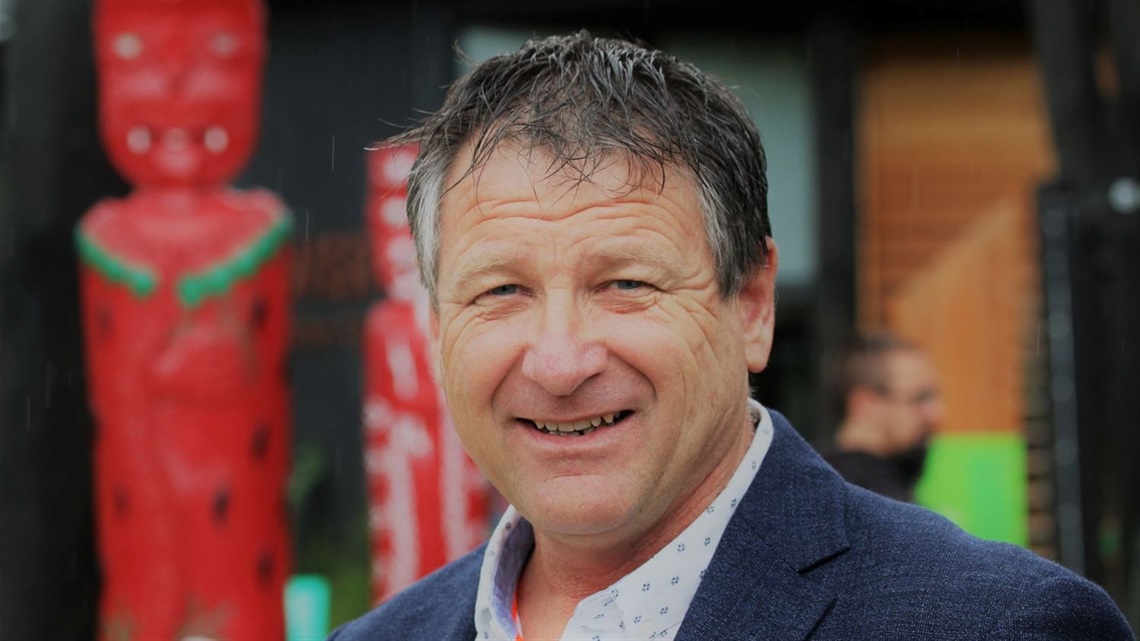Scott Bruce: Civic Award winner 2019
Published on 13 November 2019

A long-serving Rotarian, Scott Bruce reckons that working on behalf of the community generates a continuous loop of goodwill.
The Wildbase Recovery idea was sparked into life after seeing the cramped conditions at Massey University’s Wildbase Veterinary Hospital where New Zealand’s sick and injured endangered wildlife was treated and rehabilitated.
Not only was Scott determined to do something about those facilities, but he wanted a facility that provided locals with the opportunity to have a close-up encounter with New Zealand’s native fauna.
Still, he realised he wouldn’t be able to do it alone, as what started as an idea for a basic $60,000 building turned into the equivalent of a $9 million mega-project - $7 million in cash and $2 million in kind.
Scott’s Wildlife Recovery journey actually began when he joined the Rotary Club of Milson in 1999. In 2005 as the Club’s president, he organised a memorable Kiwiana-themed Rotary District Conference. That event cemented his friendship with Rodney, who was District Governor at the time.
Rotary work has involved Scott in any number of other Rotary projects, including the 2009 national Special Olympics held in Palmerston North, and raising money for the statue of CB Munro outside the NZ Rugby Museum.
A former Assistant Governor of the lower North Island’s District 9940, Scott’s Rotary work has seen him awarded two Paul Harris Fellowships. Named for the US founder of Rotary International, the scholarship acknowledges Rotary members for the depth of their community service and fundraising contributions. This was for someone who doesn’t see fundraising as his forte, but once the ball started rolling with Wildbase Recovery, there was no stopping him.
“I can’t believe someone like me could rock up to the Mayor’s office, ask for money, and that he [Jono Naylor, Mayor at the time] would say OK,” Scott says.
The ambitious vision for the Esplanade Wildbase project - to create a world-class rehab ward for native and endangered wildlife with a public education and advocacy role - is unique, possibly in the world.
However, it needed several (blue) ducks to line up before it could be realised, involving extended negotiations, collaboration and input from the Palmerston North City Council, Massey University, DoC and Rangitāne.
As for the money to make it happen, Scott and Rodney operated as a tireless two-man fundraising tag team, presenting around the country to Rotary Clubs, local and national businesses, potential sponsors and to funding agencies.
They set up a Charitable Trust, recruiting its trustees as well as a number of high profile project "Ambassadors” that included Members of Parliament and former All Blacks coach, Sir Graham Henry.
Scott and Rodney also played important roles in assisting the project partners to come up with an exciting and innovative design and helped orchestrate the memorandum of understanding between the key parties.
Scott wanted Wildbase Recovery to be a community-owned asset that would engage particularly with children. Part of the shared vision was ensuring that public entry to Wildbase Recovery was free.
The passion, drive and commitment to the project cannot be overstated, and the pair’s combined cash fundraising efforts resulted in $4.5 million being raised.
Using his practical skills and relationships in the construction industry, Scott was able to leverage materials, fabrication and installation that resulted in key suppliers providing the roof of Wildbase for free and constructing other parts of the building at cost.
His vision, coupled with the determination and perseverance to see it through, ensured that Wildbase became a catalyst project for Palmerston North, and is now making a significant difference to the character, pride, identity and perception of the city.
“One of the greatest pleasures is seeing the looks in kids’ eyes when they go through it, and watching it capture their imaginations. That’s the biggest thrill,” Scott says.